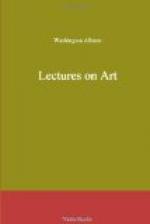But let us compare this effect with that from Beauty. Would the Parthenon, for instance, with its beautiful forms,—made still more beautiful under its native sky,—seeming almost endued with the breath of life, as if its conscious purple were a living suffusion brought forth in sympathy by the enamoured blushes of a Grecian sunset;—would this beautiful object even then elevate the soul above its own roof? No: we should be filled with a pure delight,—but with no longing to rise still higher. It would satisfy us; which the sublime does not; for the feeling is too vast to be circumscribed by human content.
On the supernatural it is needless to enlarge; for, in whatever form the beings of the invisible world are supposed to visit us, they are immediately connected in the mind with the unknown Infinite; whether the faith be in the heart or in the imagination; whether they bubble up from the earth, like the Witches in Macbeth, taking shape at will, or self-dissolving into air, and no less marvellous, foreknowing thoughts ere formed in man; or like the Ghost in Hamlet, an unsubstantial shadow, having the functions of life, motion, will, and speech; a fearful mystery invests them with a spell not to be withstood; the bewildered imagination follows like a child, leaving the finite world for one unknown, till it aches in darkness, trackless, endless.
Perhaps, as being nearest in station to the unsearchable Author of all things, the highest example of this would be found in the Angelic Nature. If it be objected, that the poets have not always so represented it, it rests with them to show cause why they have not. Milton, no doubt, could have assigned a sufficient reason in the time chosen for his poem,—that of the creation of the first man, when his intercourse with the highest order of created beings was not only essential to the plan of the poem, but according with the express will of the Creator: hence, he might have considered it no violation of the then relation between man and angels to assign even the epithet affable to the archangel Raphael; for man was then sinless, and in all points save knowledge a fit object of regard, and certainly a fit pupil to his heavenly instructor. But, suppose the poet, throughout his work, (as in the process of his story he was forced to do near the end,)—suppose he had chosen, assuming the philosopher, to assign to Adam the altered relation of one of his fallen posterity, how could he have endured a holy spiritual presence? To be consistent, Adam must have been dumb with awe, incapable of holding converse such as is described. Between sinless man and his sinful progeny, the distance is immeasurable. And so, too, must be the effect on the latter, in such a presence; and for this conclusion we have the authority of Scripture, in the dismay of the soldiers at the Saviour’s sepulchre, on which more directly. If there be no like effect attending the other angelic




